TODAY’S READING FROM THE OLD TESTAMENT- ISAIAH 25:1-28:13
Today’s Biblical tour-guide trip through the prophetic territory of Chapters 25 through 28 of the Book of Isaiah offers some breath-taking views! Some of my favorite vistas that we have seen so far of the Kingdom of our Lord Jesus Christ on this wonderful year-long hike through the Bible are here in today’s reading.
Isaiah’s prophecies focus on history’s God-glorifying goal- the establishment of Christ’s kingdom through righteousness (His finished work of redemption). He is coming to reign in righteousness and fill the earth with the knowledge of His glory. We see this promise being realized progressively in the hearts of true believers today, and will see it ultimately realized when Christ returns.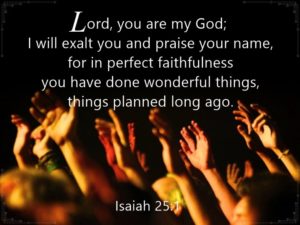
Isaiah’s prophecy in Chapter 25 begins like a Psalm. You may be familiar with the opening words as they are sometimes sung in worship choruses:
Isaiah 25:1 1 O LORD, you are my God; I will exalt you and praise your name, for in perfect faithfulness you have done marvelous things…
However, the popular worship chorus omits the end of the verse- the reference to the predeterminate counsel of God: “things planned long ago” (25:1). It also does not explain that the ‘marvelous things’ planned long ago were the righteous judgments that were to come upon the world system of unbelief (25:2-5). As Christ comes to reign as King, He first comes as Judge, bringing low the pride of humanity and putting all the enemy forces of evil at bay.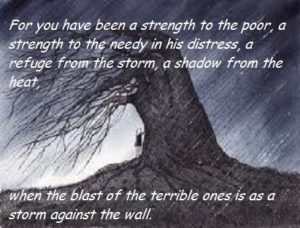
The righteousness of God will be fully vindicated in His judgments, as well as His mercies.
Isaiah sees this clearly. He sees God’s righteousness and mercy on display in the past, present, and future of history. Isaiah praises God with gospel truth: “You have been a refuge for the poor” in the past. “You silence the uproar of foreigner” in the present. “He will swallow up death” in the future.
The gospel of Jesus Christ offers perfect forgiveness to shelter us from condemnation for our guilty past. The gospel offers His presence as a comfort and protector in the present. It offers us His assurance of resurrection glory to dispel all fear of the future.
In verse 5, we read, “On the mountain of the Lord Almighty”. We have been learning that in the language of this prophet, a ‘mountain’ is a symbol of governmental authority. ‘The mountain of the Lord’ speaks of the government of God and the Kingdom Reign of Christ on the earth.
When Christ returns to reign on the earth, we will experience the abundance of His provision (25:6), the dispelling of all Satan’s lies that blind the minds of the nations (25:7) and the resurrection unto ‘deathless life’ in God’s presence to share partnership in His kingdom reign on the earth for the believer (25:8).
Notice the similarities between Isaiah’s vision and that of the Apostle John in the Book of Revelation:
Isaiah 25:8 8 He will swallow up death for all time, And the Lord GOD will wipe tears away from all faces, And He will remove the reproach of His people from all the earth; For the LORD has spoken.
Revelation 21:4 4 and He will wipe away every tear from their eyes; and there will no longer be any death; there will no longer be any mourning, or crying, or pain; the first things have passed away.”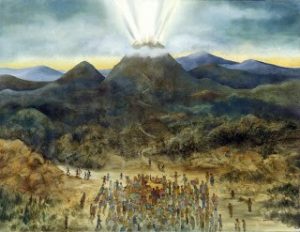
The ‘mountain of the Lord’, speaks of the government of God established through Christ and mediated to the heart of the believer by the Holy Spirit. In contrast, ‘Moab’ symbolizes that which wars against the knowledge of God’s glory. Moab is a type of the flesh that wars against the Spirit.
The Apostle Paul uses this imagery when he teaches New Testament believers to walk in the Spirit, so they do not fulfill the lusts of the flesh (Galatians 5:16). He teaches believers that the weapons of their warfare are not of the flesh. Instead they refute the flesh.
2 Corinthians 10:3-6 3 For though we walk in the flesh, we do not war according to the flesh, 4 for the weapons of our warfare are not of the flesh, but divinely powerful for the destruction of fortresses. 5 We are destroying speculations and every lofty thing raised up against the knowledge of God, and we are taking every thought captive to the obedience of Christ, 6 and we are ready to punish all disobedience, whenever your obedience is complete.
Paul sees a correlation between ‘the destruction of fortresses’ in the Isaiah prophecy picturing the progress of the believer in personal sanctification.
Isaiah 25:12 12 The unassailable fortifications of your walls He will bring down, lay low and cast to the ground, even to the dust.
Notice all the references to what will occur in the future, “In that day”. Remember we spoke of ‘the Day of the Lord’ having two parts. The first part of the day is the darkness of night, coming at sundown. This represents the judgment of the Lord falling upon sin. This is followed by the day of God’s reign in righteousness established in human hearts and upon the earth.
We can experience this future reality of the kingdom of God in our hearts in the present moment.
Isaiah 26:3 3 “The steadfast of mind You will keep in perfect peace, because he trusts in You.
We can experience His kingdom of righteousness, peace and joy through the Holy Spirit (Romans 14:7) if we are ‘steadfast of mind’ and are putting our trust in Christ moment by moment.
How wonderful to know that there is so much of the ‘not yet’ kingdom that we can experience today.
Walking in the Spirit (Romans 8:4; Galatians 5:16,25) involves walking in the law of love (John 13:34; 15:12, 17; Romans 13:8, 10; Galatians 5:14, 23; James 2:8; 1 John 3:23, 2 John 1:5-6) the law of liberty (James 1:25; 2:12), the law of Christ (Romans 10:4;1 Cor 9:21; Galatians 6:2), and the law of the Spirit of life in Christ Jesus (Romans 8:2).
Isaiah 26:8 8 Indeed, while following the way of Your judgments (laws), O LORD, we have waited for You eagerly; Your name, even Your memory, is the desire of our souls.
Notice the promise of the resurrection of our physical bodies in Isaiah 26:19:
Isaiah 26:19 19 Your dead will live; Their corpses will rise. You who lie in the dust, awake and shout for joy, for your dew is as the dew of the dawn, And the earth will give birth to the departed spirits.
The Old Testament affirms what we read in the New Testament. There is life after death. Physical life in a physical body.
1 Corinthians 15:50-53 50 Now I say this, brethren, that flesh and blood cannot inherit the kingdom of God; nor does the perishable inherit the imperishable. 51 Behold, I tell you a mystery; we will not all sleep, but we will all be changed, 52 in a moment, in the twinkling of an eye, at the last trumpet; for the trumpet will sound, and the dead will be raised imperishable, and we will be changed. 53 For this perishable must put on the imperishable, and this mortal must put on immortality.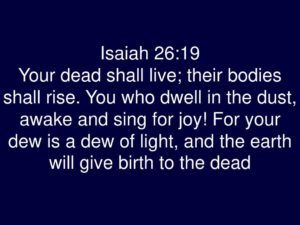
Dead believers will arise with new bodies that are like the one that Jesus had when he was raised from the dead. This important fact is part of our blessed hope.
Philippians 3:20-21 20 For our citizenship is in heaven, from which also we eagerly wait for a Savior, the Lord Jesus Christ; 21 who will transform the body of our humble state into conformity with the body of His glory, by the exertion of the power that He has even to subject all things to Himself.
Other passages in the Old Testament refer to the believer being resurrected after death in a new body- Job 19:26; Psalm 16:10; and Daniel 12:2,13.
Other accomplishments of the Lord “in that day” include His putting to death the Antichrist and the false prophet, the Leviathan, described here as the fleeing and twisted serpent, and the dragon that is in the sea (Satan) (Isaiah 27:1; Revelation 13).
“In that day”, Israel will be grafted into the true vine, and will be a pleasant vineyard. All enemies will be at bay in the millennial kingdom. The whole world will benefit from Israel’s fruit. The Lord has chastened Israel with judgement and exile. But she has repented, turned away from her idolatries and has worshiped the Lord.
The enemy’s strongholds are broken down and inhabited by those who lack discernment.
The blowing of the trumpet (Isaiah 27:13) makes us think of the trumpet judgments in the Book of Revelation that emerge when the seventh seal is broken (Rev 8).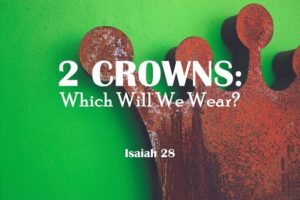
Chapter 28 is another prophecy of judgment upon the northern kingdom (Ephraim). Israel is described as a fading flower, a first-ripe fig, that is a fig that appears to be ripe but is not. When one eats it, they are surprised to find that it is disappointing.
The kingdom of God, however, is not disappointing.
Isaiah 28:5-6 5 In that day the LORD of hosts will become a beautiful crown And a glorious diadem to the remnant of His people; 6 A spirit of justice for him who sits in judgment, A strength to those who repel the onslaught at the gate.
Israel is deceived into false righteousness, imaging that it has a right standing through its law-keeping.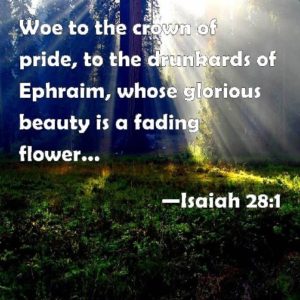
Isaiah 28:10 10 “For He says, ‘Order on order, order on order, Line on line, line on line, A little here, a little there.'”
Law-keeping produces relative righteousness at best. Only a little here and there.
Jesus offers a better way- rest in Him and what He has accomplished.
Isaiah 28:12 12 He who said to them, “Here is rest, give rest to the weary,” And, “Here is repose,” but they would not listen.
Jesus fulfills this in Matthew.
Matthew 11:28-30. 28 “Come to Me, all who are weary and heavy-laden, and I will give you rest. 29 “Take My yoke upon you and learn from Me, for I am gentle and humble in heart, and YOU WILL FIND REST FOR YOUR SOULS. 30 “For My yoke is easy and My burden is light.”
TODAY’S READING FROM THE NEW TESTAMENT – GALATIANS 3:10-22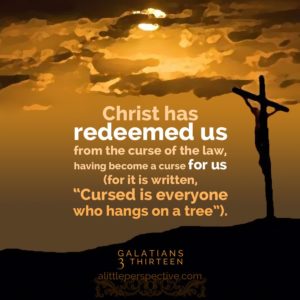
The Apostle Paul continues to prove that God never intended conformity to the Law to be the means of a person’s justification before God. The Law cannot save anyone.
Paul uses ‘the curse motif’ to describe how the Law condemns us and how Christ justifies us.
The Law concludes that all have sinned (Romans 3:23). As far as Adam’s race goes, “There is none righteous. No, not even one” (Romans 3:10). Everyone stands condemned under the Law, and therefore under its curse. Paul refers to Deuteronomy 27:26:
Deuteronomy 27:26 26 ‘Cursed is he who does not confirm the words of this law by doing them.’ And all the people shall say, ‘Amen.’
This Law can do nothing to reverse the condemnation. However, Christ fulfills the Law on our behalf as our substitute. His righteousness merits the blessing of the Law. Yet He willingly identified with the transgressors of the Law but taking the punishment the transgressor deserves. He took the curse of the Law upon Himself when He hung on the cross.
Deuteronomy 21:22-23 22 “If a man has committed a sin worthy of death and he is put to death, and you hang him on a tree, 23 his corpse shall not hang all night on the tree, but you shall surely bury him on the same day (for he who is hanged is accursed of God), so that you do not defile your land which the LORD your God gives you as an inheritance.
Jesus bore the punishment of the transgressor, that those who believe on Him, would not have to bear their own punishment.
Galatians 3:13 13 Christ redeemed us from the curse of the Law, having become a curse for us—for it is written, “CURSED IS EVERYONE WHO HANGS ON A TREE”—
Paul refers to Jesus being our curse-bearing substitute, in order that we might receive the blessing that was promised to come to us through Abraham’s seed- a new life ‘in Christ’ through the Spirit (Galatians 3:14).
Paul proves that the Judaizers are false teachers by putting the Law of Moses in its proper context. Right from the beginning salvation is offered freely through faith in God’s promise of a Savior, who would reconcile all things to Himself by becoming our sin-bearing substitute- the Lamb of God who takes away the sin of the world (See Colossians 1:20-23; John 1:29).
If salvation is by grace through faith in the promise, what is the purpose of the Law? Paul clarifies that the promise was given 430 years before the Law of Moses. The Law was not added as a new way to salvation, but because of the transgression of self-righteousness. The Law was given to show the need for the Savior, the Messiah. It had no power to make a person righteous because it could not impart a righteous life. It was a shadow of the righteousness that God required and would be found and fully fulfilled in Christ.
Faith does not annul the Law of God. It still gives us a picture of God’s righteousness that God requires, even as a menu with photos gives you a picture of the desired meal. But you don’t eat the menu.
TODAY’S READING FROM THE BOOK OF PSALMS – PSALM 61:1-8
This is a good psalm to remember when you are feeling ‘overwhelmed’.
This is a Psalm of David. He is feeling faint and inadequate. We don’t know which particular episode made him feel this way. There were many incidents that might have provoked these feelings and this particular ‘heart cry’!
Psalm 61:2 2 From the end of the earth I call to You when my heart is faint; Lead me to the rock that is higher than I.
David knew that his only hope for true security was beyond his own reach. It could only be had through faith in God’s grace. Grace is God doing for us what we cannot do for ourselves. It is unmerited favor. God’s favor towards the penitent sinner is to lift him up to himself and hide him in the refuge of the Rock of His own righteousness- Christ Jesus.
David’s experience has taught him of this mercy. This encourages him to cry out once more. The Lord is a continual help in times of trouble.
This is the heritage of all who trust in God’s promise. God’s faithfulness gives King David hope for the future.
Psalm 61:5-6 5 For You have heard my vows, O God; You have given me the inheritance of those who fear Your name. 6 You will prolong the king’s life; His years will be as many generations.
How wonderful to consider that David’s Savior would be from among the many generations of his own seed after him.
The last verse reminds us of an important quality of a worshiper and follower of the Lord Jesus- faithfulness to our commitments.
Psalm 61:8 8 So I will sing praise to Your name forever, That I may pay my vows day by day.
TODAY’S READING FROM THE BOOK OF PROVERBS – PROVERBS 23:17-18
Proverbs 23:17-18 17 Do not let your heart envy sinners, but live in the fear of the LORD always. 18 Surely there is a future, and your hope will not be cut off.
PRAY FOR THE NATIONS- Nicaragua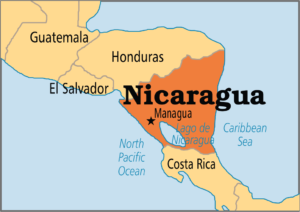
Nicaragua
Republic of Nicaragua
Latin America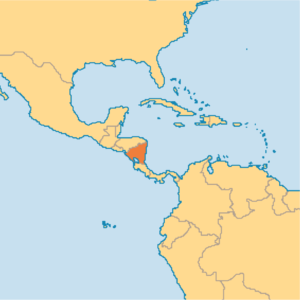
Geography
Area: 127,849 sq km
The largest of the Central American republics. Central mountainous area between Pacific and Caribbean coasts.
Population: 5,822,265 Annual Growth: 1.31%
Capital: Managua
Urbanites: 57.3%
HDI Rank: 124 of 182 (UN Human Development Reports 2009)
Peoples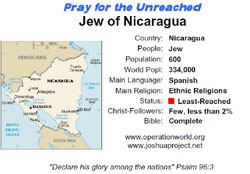
Peoples: 18 (6% unreached) All peoples
Unreached Peoples Prayer Card
Official language: Spanish. English-speaking communities on east coast Languages: 7 All languages
Religion
Largest Religion: Christian
|
Religion |
|
Pop % |
Ann Gr |
|
5,666,228 |
97.32 |
1.4 |
|
|
1,732,307 |
29.8 |
5.5 |
Challenges for Prayer
Nicaragua’s divided past still influences the present. The traumatic events of 1979-1998 divided politics (left- and right-wing), communities (the Hispanic-Mestizo west and Creole-Amerindian east), trade unions, churches and families. The situation is changing, but there is still lingering distrust along these fault lines that needs to be overcome.
Christian support ministries for prayer:
- a) Christian radio and TV. There is one Christian TV station and 10 radio stations.
- b) The Bible Society has done much in enabling the translation and distribution of the new Sumo and Miskito Bibles. The Bible League and GRN also provide gospel literature and recordings in several languages.
- c) Development projects for urban and rural communities by means of credit and training that contributes to socio-economic and spiritual growth. These projects are a key aspect in empowering Nicaraguans to move their nation forward toward stability and prosperity.
From PRAYERCAST.COM
Volcanic eruptions, earthquakes, hurricanes, civil wars, and oppressive dictatorships all play a part in the story of Nicaragua. This nation of only 5.6 million people is physically the largest of the Central American republics and is comprised of a very mountainous terrain between its Pacific and Caribbean coasts. As the people of Nicaragua face physical hardships, they embrace a wide variety of passions, including baseball, poetry, and reggae music.
While numerous mineral resources, fertile soil, and a low population give Nicaragua the potential for great wealth, its troubled past has kept it one of the poorer nations in the Americas. The corrupt Somoza dictatorship, which ended in 1979 after civil war, was full of brutality toward the opposition and a hoarding of the nation’s wealth to benefit the dictator’s family. Following the dictatorship, another brutal civil war broke out between the Marxist Sandinista government and the U.S.-backed Contra government. The right wing Contra’s won free election in the early 1990’s, but the civil war left deep political rifts that continue today.
Through these tragedies of political corruption and natural disasters, God is at work softening the hearts of Nicaraguans. The same volcanic eruptions, earthquakes, and hurricanes that bring hurt are also being used by God to lead the people of Nicaragua to consider matters of life and morality. Over 97% of the population identify themselves as Christian, though nominalism – cultural Christianity – and syncretism bind much of the Church from a vibrant faith. Evangelicals have grown from 2% to 30% of the population over the past 50 years, but there is great need for unity among this group, as denominations and even local churches are hampered in their ministry by theological divisions.
PRAYER: O Lord, You are our God and we will exalt You and praise Your Name. You have indeed done marvelous things that have been planned before the foundation of the world. We praise You for Your righteous ways and for doing for us what we could not do for ourselves! You have provided for us a right standing with You in the person of Your Son in whom we are made complete and accepted in Your presence. We are grateful for the person of the Holy Spirit who has established Your rule in our hearts through the indwelling life of Your Son. Help us to rely on Him for the fulfillment of our faith-commitments. In Jesus’ Name. Amen.
-Pastor David
